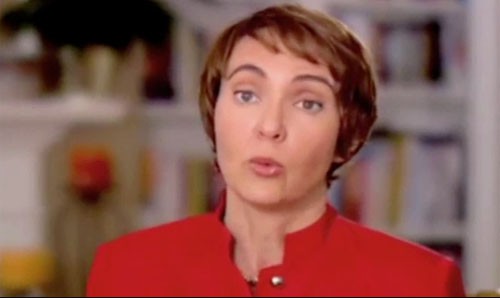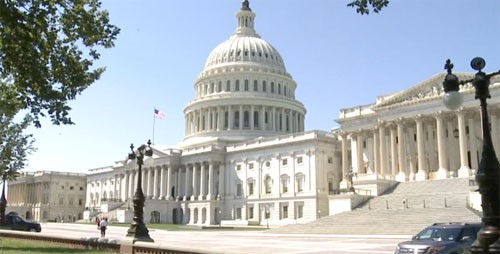Cronkite News has moved to a new home at cronkitenews.azpbs.org. Use this site to search archives from 2011 to May 2015. You can search the new site for current stories.
Giffords steps down, leaving a healthy campaign fund untouched – for now
WASHINGTON – Rep. Gabrielle Giffords’ political future came into focus Sunday when the Tucson Democrat announced she would resign from Congress this week to focus on her recovery.
The fate of Giffords’ healthy campaign fund, however, is not yet so clear.
“We haven’t made decisions yet,” said Laura Almquist, treasurer for Giffords’ campaign. The campaign reported $878,936 in the bank as of Sept. 30, the most recent filing with the Federal Election Commission.
Almquist said the campaign staff is aware several options are available for the use of the funds – everything from giving the money back to donors to holding on to it for a future race.
According to FEC rules, Giffords can give unlimited campaign funds to any national, state or local political party committee or give it to other candidates seeking state or local office, pursuant to state law. She could also donate the money to a charity or give it back to the original donors.
Retired members of Congress face virtually the same campaign finance restrictions as sitting members, said Michael Malbin, executive director of Campaign Finance Institute. While he could not speculate on what Giffords might do with her funds, he said there is “plenty of precedent” for transferring money to party committees.
In 2004, former Vice President Al Gore gave the Democratic National Committee about $4 million left over from his unsuccessful 2000 presidential campaign, Malbin said.
“As long as it’s a campaign committee and she doesn’t convert it to a multicandidate committee, she can contribute unlimited amounts to the party,” Malbin said.
Giffords can also use the money for any other lawful purpose, as long as it is not for personal use.
“Any expenditure that would have existed irrespective of her role as an officeholder or a candidate would be out of bounds,” said Bob Biersack, senior fellow at the Center for Responsive Politics, in an email.
Giffords was shot in the head on Jan. 8, 2011, when a gunman opened fire at a Tucson constituent event, killing six and wounding 13. She has spent the past year recovering from her injuries and announced in a video message Sunday that she would resign this week in order to continue to focus on her recuperation.
The resignation will require a special election to elect a replacement. Gov. Jan Brewer will set the date of the election after Giffords steps down. Several Republicans and Democrats are rumored to be interested in the seat, which historically has been a competitive district.
“There have not been any conversations between us and her campaign about her seat or her funds,” Arizona Democratic Party spokesman Andy Barr said.
The state party was unaware Giffords was planning to step down but is not worried about her seat or the campaign funds she has collected, Barr said.
“There is massive grassroots support for Gabby and her folks,” he said. “I don’t expect that that is going to dissipate.”
Giffords can also choose to keep the money for use in a future election, something she hinted at in the two-minute video announcing her resignation plans.
“I will return, and we will work together for Arizona and this great country,” Giffords said.
No one is saying she will. But, Almquist said, “We hope she runs again.”









